




 |
   |
 |
|
Richard Swift Swirlies |
Sylvia Symphonic Slam |
Synchestra Synergy |
System of a Down Systems Theory |
 |
The Atlantic Ocean (2009, 40.28) ***/T½ |
|
| The Atlantic Ocean The Original Thought Ballad of Old What's His Name R.I.P. Already Gone Hallelujah, Goodnight! The First Time Bat Coma Motown |
The End of an Age A Song for Milton Feher Lady Luck |
|
Current availability:
Mellotron used:
Richard Swift (1977-2018, previously of Starflyer 59) might best be described as a kind of quirky singer-songwriter, mixing folk, indie, big band stylings and synthpop into something that's a lot more interesting than your usual nonsense, but less likely to sell in any quantity as a result. 2009's The Atlantic Ocean is well-crafted and (relatively) original, a quality at a premium in most music (most art forms?) these days, possibly at its best on R.I.P., Already Gone and A Song For Milton Feher. Many tracks mix analogue polysynths (or facsimiles thereof) with folk instrumentation, making for an intriguing, if not always fully workable combination.
Swift and Wilco's Pat Sansone play Mellotron, most likely Wilco's, one of the album's five recording locations being 'Wilco's Loft', with strings and oboes (?) doubling real viola on R.I.P. from both players, while Swift adds a rising string line to Hallelujah, Goodnight! and more strings-doubling-viola to The First Time, although the descending flute line on A Song For Milton Feher (not credited as Mellotron, anyway) is more likely to be synthesized. Tragically, after just two more albums, Swift died in 2018 at the age of forty-one, after a lifelong struggle with alcohol addiction.
See: Samples etc.
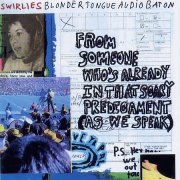 |
Blonder Tongue Audio Baton (1993, 42.32) **/0 |
|
| Untitled Bell Vigilant Always His Love Just Washed Away His Life of Academic Freedom Pancake Jeremy Parker Park the Car By the Side of the Road |
Tree Chopped Down Wrong Tube Wait Forever |
|
Current availability:
Mellotron used:
Swirlies are apparently often compared to My Bloody Valentine, although I detect a Buzzcocks influence on their first full album, 1993's Blonder Tongue Audio Baton. To be brutally honest, at least to my ears, they're nothing more exciting than rowdy indie, occasionally descending into noise, although Pancake is possibly above average. I know this kind of stuff's popular in certain quarters, but I'm afraid they're not the quarters I inhabit.
Although both guitarists, Damon Tutunjian and Seana Carmody, are credited with 'Moog synthesizer and Mellotron', I can quite honestly say that I didn't hear a note of the Great White Beast (presumably Fort Apache Studio's M400) across the entire album. I'm not saying it isn't there, only that I couldn't hear it; perhaps the high... somethings on Pancake or Park The Car By The Side Of The Road?. It may well be buried elsewhere in some of the album's washes of noise, but it could just be Moog, feedback or something else entirely.
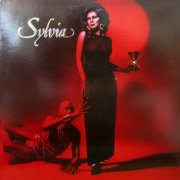 |
Sylvia (1976, 35.55) **½/TL.A. SunshineYou Sure Love to Ball He Don't Ever Lose His Groove Next Time That I See You Sweet Stuff Taxi Mr. Bartender Standing at the End |
Current availability:
Chamberlin used:
I believe 1976's Sylvia was Sylvia van der Pool Robinson's second album, a pretty typical mid-'70s soul/soft funk effort, albeit one with a higher than average synth presence (programmed by none other than Larry Fast) on a few tracks, notably some trademark trills on opener L.A. Sunshine. I've heard worse in this area, although Sylvia's breathy, spoken vocals on the somewhat provocatively-titled You Sure Love To Ball (written by Marvin Gaye, it seems) and Taxi are a bit tedious. At least it doesn't descend into Disco Hell.
It seems that the album's three Chamberlin/synth tracks were recorded at a different studio to the rest of the album, explaining Fast and Brian Cuomo (Fireballet/Intergalactic Touring Band)'s contributions on the same songs. Cuomo played Chamberlin, with nothing audible on L.A. Sunshine, background strings on You Sure Love To Ball and fairly obvious ones on closer Standing At The End, although the rest of the album's strings are real. Sylvia's greatest claim to fame is as founder of New York's Sugarhill Records, early adopters of hip-hop, although I'm sure '70s soul aficionados go nuts over her solo career. Anyway, perfectly acceptable within its genre, but a bit pointless otherwise, with next to no tape-replay work.
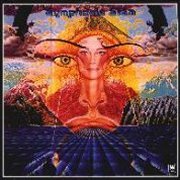 |
Symphonic Slam (1976, 41.32) ***½/T |
|
| Universe Everytime Fold Back I Won't Cry Let it Grow Modane Train Times Run Short Days |
Summer Rain How Do You Stand |
|
Current availability:
Mellotron used:
Symphonic Slam were guitarist Timo Laine's baby, although they're best known for providing Rainbow with their third keyboard player, David Stone. Laine actually lists his main instrument as the '360 Systems polyphonic guitar synthesizer', although guitar synthesis of any sort was a somewhat inexact science in 1976. It's fairly easy to spot where he uses it, as synth lines track the guitar parts (listen to the unaccompanied solo on How Do You Stand), with Stone often being used in a rather background role, which may explain his defection to Blackmore's crew, aside, of course, from the obvious. The band were a trio, with no bass, so although the low frequencies are covered by Stone's keys, the album is rather lacking in the bottom end.
The music's a sort of hard rock/pomp hybrid, with a progressive edge in places, although the sleeve suggests a far proggier proposition. Laine's vocals are in the North American rock'n'roll tradition, which you will probably either love or hate. I know I do. The band sound like they needed to decide which way they were going to go, as Symphonic Slam tries too hard to be all things to all men, with funky clavinet parts one minute (I Won't Cry) and, er, symphonic keys the next (Universe). Actually, the most 'progressive' part of the album are the first three tracks, which segue into a rather good thirteen-minute piece, after which things go downhill. Stone's Mellotron use is pretty sparse, to be honest; opener Universe has choir and flute parts, with cellos on Everytime, while closer How Do You Stand has some fairly overt choirs, but that appears to be it.
I've seen references to a second Symphonic Slam album, which may have appeared under the name Timo Laine, but I don't seem to be able to trace them at the moment. Symphonic Slam itself is... OK. Nothing spectacular; although the first half of the first side is pretty good, the Mellotron work is unremarkable, with Laine's guitar synth taking up most of the bandwidth. File under 'also-rans'.
A year or two back, I stated: "Interestingly, it appears that Universe isn't actually Laine's own song, as stated in the credits, as the music's been ripped off hook, line and sinker from Road To Hades, from fellow Canuck Neil Merryweather's Space Rangers album from two years earlier. I don't know if there's an untold story here, or whether Laine just decided to 'borrow' the piece - anyone out there know? (Thanks to Joe Ellis for that one - hi, Joe)." Wellll... There certainly is an untold story... I've just been written to by Timo Laine himself, who tells me that he didn't rip off Merryweather - Merryweather ripped him off, not to mention the rest of his band. Laine wrote nearly all the material on the album, but had his writing credits stolen, making him feel more than justified in re-recording his own work! Apologies to all concerned for my inadvertent faux pas, but the story's hardly common currency... Let's hope this mention (and the one I've added to the Merryweather review) help to set the record straight.
See: Neil Merryweather
 |
Mother Earth's Lullaby (1981, 44.59) ***/TSequence in Earth NaturalSlopes |
Current availability:
Mellotron used:
After playing guitar and bass in several bands, Ed Van Fleet began composing and recording electronic music as Synchestra at the beginning of the '80s, debuting with 1981's cassette-only Mother Earth's Lullaby, featuring two side-long tracks. Don't come here hoping for a lost Berlin School album; this sits firmly in the emergent new age bracket, crossing over into prog-lite in places; all very pretty, especially parts of side two, Slopes, but somewhat unengaging.
Van Fleet plays Mellotron, if only just, with distant choirs some minutes into Sequence In Earth Natural, with a lone choir swell further on and a couple of bursts of choir on Slopes, backing real voices, the whole barely scraping one T. There are still lost Mellotron Classics to be discovered, but, sad to say, this isn't one of them.
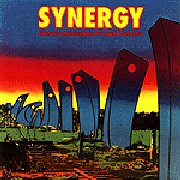 |
Electronic Realizations for Rock Orchestra (1975, 46.46/49.46) ****½/TTTTLegacySlaughter on Tenth Avenue Synergy Relay Breakdown Warriors [CD adds Classical Gas (1975 version)] |
Current availability:
Mellotron used:
Synergy was and is, Larry Fast's perennial solo electronic music project. Fast has guested with more bands than you can shake a stick at (just off the top of my head, Peter Gabriel, Nektar, FM and the woeful Intergalactic Touring Band) and has been generally regarded as a serious synth-whizz for over twenty-five years. Electronic Realizations for Rock Orchestra was the first and possibly best Synergy album; all electronic, the writing is excellent, with none of that 'set the sequencers off and noodle over the top' attitude of some of his less illustrious genre-mates. All five tracks are extremely good, but top marks probably have to go to Slaughter On Tenth Avenue for its deeply eccentric main theme, although, to be honest, it's difficult to elevate one track above any of the others.
Fast's entire equipment list for the album consists of a MiniMoog, an Oberheim expander and a Mellotron, which he has subsequently claimed 'was only used on about 6% of the album', to which I say: Rubbish. Its use may be fairly sparse in places, but it's audible on all five tracks, particularly Slaughter On Tenth Avenue, with chordal string and flute parts all over the place. It's less upfront on much of side two, until closer Warriors, with great slabs of strings backing the synths throughout much of the piece. Basically, while you shouldn't expect to hear it throughout, this is definitely a Mellotron Album in the truest sense of the phrase. Buy.
See: Samples etc. | Nektar | Annie Haslam | FM | Intergalactic Touring Band
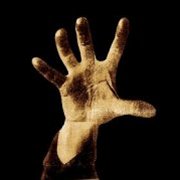 |
System of a Down (1998, 40.36) ***/T |
|
| Suite-Pee Know Sugar Suggestions Spiders DDevil Soil War? |
Mind Peephole CUBErt Darts P.L.U.C.K. |
|
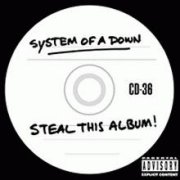 |
Steal This Album! (2002, 43.28) ***½/T |
|
| Chic'n'Stew Innervision Bubbles Boom! Nüguns A.D.D. Mr.Jack I-E-A-I-A-I-O |
36 Pictures Highway Song Fuck the System Ego Brain Thetawaves Roulette Streamline |
|
Current availability:
Mellotrons used:
System of a Down began as an Armenian/American post-thrash outfit, quickly shifting into more interesting territory, to the point where many progressive fans tacitly admit, 'er, they're actually quite good'. Heavily political, in a good, anti-war, left-wing kind of way, the band have written songs about the 1915 Armenian genocide by the Turks and aren't afraid to tackle issues seemingly considered verboten by 'normal' (i.e. right-wing) society, putting them to music influenced by Black Sabbath, the first wave of thrash bands (Metallica et al.) and, if guitarist Daron Malakian is to be believed, The Beatles.
Their eponymous 1998 debut is an unusually diverse album from a modern metal band, although that's in keeping with their experimental ethos. Surprisingly, even the full-on metal end of their sound (occasional death grunts and all) prove far more listenable than expected, although to call this 'prog' would be pushing it a bit. OK, more than a bit. Anyway, possibly real Mellotron on one track, probably from vocalist Serge Tankian, with a pretty real-sounding strings part on War? that improves an already good track.
Steal This Album! is their third release, although it consists of leftovers from previous projects, largely the previous year's Toxicity. I'm usually allergic to this kind of stop/start metal stuff, but there's hardly anything on the album that made me blanch, proving various friends' points that they're vastly more interesting than yer usual thrash crew, because...? I'm not even sure, but they're very listenable and don't sing the usual faux-violent crap we've come to expect from the genre. Someone (Tankian?) plays Mellotron on Roulette, a nice little song consisting of woefully out of tune harmony vocals, acoustic guitar and Mellotron cellos, strings and flutes; it appears to be the real deal, too, which is always nice.
See: Scars on Broadway
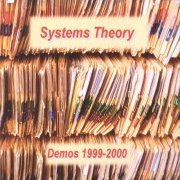 |
Demos 1999-2000 (2000, 42.52) ****/TTTUnder Oriental SkiesBreakdance in Hell Where Titans Sleep Strange Obsession The Boy Who Gazed at Stars |
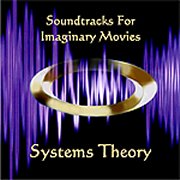 |
Soundtracks for Imaginary Movies (2004, 74.16) ****½/TTTT½ |
|
| Green Miata Baja Bound The Cool Vibe of Asia C Four Piece Suit A Wolf in Sheep's Breeks Larks Loons in Linen Technopants Solar Flared Trousers Silent Service A Lifeboat, Tallulah and Me |
Water Through Fingers Zero Sum Equation One Step to Freefall Last Letters From Stalingrad |
|
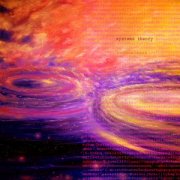 |
Codetalkers (2007, 76.15) ****/TTTT½No Deli in DelhiRiverrun (Harmelodythm) Spamivore Car Crash Messiah SohCahToa (the Lost Tail-Wagging Dog) Memory of Ur (Parts 1 and 2) Codetalker Berlin Night Express Red Sun Fading |
Current availability:
Mellotrons used:
Systems Theory describe themselves as an 'Internet project' and given that two members live in southern California and the third in Scotland, you can see why. Although they describe themselves as a 'progressive electronic/world music/prog-rock/fusion hybrid', it's fairly safe to say that they effectively fall under the banner of 'electronic music', with other bits thrown in. It seems that British ex-pat Steven Davies-Morris and Greg Amov met at high school in the late '70s, working together on and off over the years, before coalescing into Systems Theory in the late '90s. Mellotron owner Mike Dickson (scourge, or 'official cynic' of Streetly Electronics) came aboard initially as a collaborator, becoming a full member later.
Demos 1999-2000 is exactly what it says on the box, although the hoped-for album following their recording didn't happen. Five instrumental pieces, although I believe some of them were originally intended to be vocal numbers (can't work out how, but there you go). Different feels on each track, with the laid-back yet oddly insistent Under Oriental Skies in stark contrast to the rhythmic Breakdance In Hell, with the highlight possibly being The Boy Who Gazed At Stars. Mike's Mellotron work only features on three tracks, the other two being recorded before his involvement in the project, but what he's done reaches far further than the 'usual suspect' sounds. Incidentally, his actual working methods involve 'doodling' onto tape, which is then sampled and layered onto the tracks where suitable by Steven, although given that the parts were played on a real Mellotron, this shouldn't be regarded as using samples. Anyway, while Breakdance In Hell features some string work, it's mainly characterised by its choirs, while there are more strings on Where Titans Sleep and Mellotron 'Ian McDonald' flutes at the beginning of Strange Obsession. Incidentally, the 'Mellotron' work on the two Mike-less tracks is Steven on the Pinder CD-ROM.
Their second set of demos are no longer available (reviewed here), but they finally released their first proper album, Soundtracks for Imaginary Movies, in 2004. Unsurprisingly, it has a great deal in common with their two 'official' sets of demos; three tracks from 2001-2 are available here in rerecorded form. The sound? Very obviously Systems Theory, integrating their various influences to the point where their original description of themselves (see above) has actually reached fruition and they are barely recognisable as a 'typical electronic outfit' any more. Truly progressive rock. The album is split into three fairly equal virtual 'sides' of material, making a future vinyl release a possibility, giving the CD more of a 'good old-fashioned record' feel than is usual these days.
Mike Dickson assures me that he used just about every Mellotron voice he owns on the album, though they're not all readily apparent, adding both bass clarinet and cor anglais to his previous arsenal. His use across the album veers between full-on strings and choir (much of Four Piece Suit) to church organ (Silent Service), clarinet (A Lifeboat, Tallulah And Me) and flutes (Zero Sum Equation). The end section of Water Through Fingers is apparently no fewer than 18 Mellotron string sounds stacked up and sounds like it. Not sure where the slightly more esoteric sounds are used; I'm sure subsequent listens will reveal them eventually. Soundtracks for Imaginary Movies is proof that bands shouldn't rush their first albums; it's a mature work that transcends its influences to create something genuinely new. Highly recommended.
Codetalkers was supposed to appear in 2006, but serious illness delayed the project until it presumably didn't seem worth releasing in the usual fashion. It's finally been made available as a download in 2007 and proves itself nearly as good as its predecessor, featuring the by-now familiar mixture of electronic, progressive and world stylings. If the album has a fault, it's that, like Soundtracks..., it's too long to listen to comfortably in one sitting, being as long as a double LP. I know it's great 'value for money' (especially when it's free), but it does slightly outstay its welcome. On the Mellotron front, apart from the 'usual' sounds (strings, choirs and flutes in various combinations on most tracks), I presume that's Mellotron brass four minutes or so into Riverrun (Harmelodythm) and I'm sure there are a raft of more exotic sounds that aren't nearly so easy to spot (Steve Hackett sustained guitar, an unidentified woodwind in Red Sun Fading, maybe?). Huge amounts of choir on Spamivore, although it basically just repeats the same riff for several minutes, rather in the way Harmonium did with strings. 'Stabbed' choir chords in SohCahToa just wouldn't sound like that if sampled and the flute intro on Red Sun Fading is sublime. Mike assures me that SohCahToa actually has ten different Mellotron sounds on it and Car Crash Messiah features the MkII moving strings, too.
So; both collections of demos would stand up perfectly well as albums 'proper', but are seriously outclassed by Soundtracks for Imaginary Movies itself. Spend your hard-earned on the album, then download Codetalkers, followed by the demo sets. Now.
See: Unreleased | Mike Dickson